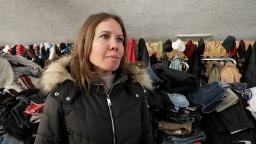
Zaporizhia, Ukraine (CNN)When translator Yulia Karaulan left Ukraine for a business trip to Italy on February 20, she thought she would be back with her family in a few days.
But the short journey turned into a nightmare.
“When I came (back) to my city, it was already blocked by Russian troops,” said 38-year-old Karaulan. “And now I can’t go back because it’s impossible.”
All her family and friends are trapped in her hometown of Mariupol in southern Ukraine, including her husband Evgeny, 10-year-old daughter Yasia and her mother.
They shelter in a basement that protects around 4,000 people from Russian bombs, which continue to fall two weeks after the invasion began.
At least 1,300 civilians have been killed and nearly half a million people are trapped in the city as a humanitarian disaster unfolds, according to two officials in Mariupol.
“They can’t go out most of the time because of the heavy shelling,” said Karaulan, who is now in Zaporizhia, a city about 200 kilometers north of Mariupol.
On Wednesday, a Russian bomb hit a maternity and children’s hospital, killing three people including a child, injuring 14 others and leaving a huge crater in the ground.
The attack came despite Russia agreeing to a brief ceasefire to allow for evacuations. Ukrainian President Volodymyr Zelenskyy called the attack “beyond atrocities” and a “war crime”.
“I can’t (yet) believe that this can happen,” said Karaulan. “It’s very hard to believe.”
Karaulan, who speaks English, Russian and Ukrainian, has lost all contact with her family for the past eight days. But she finally got the call she was waiting for on Wednesday.
“My husband called me and said they were alive,” Karaulan said, breaking down in tears. “My daughter told me she loves me.”
“She is like all children (now) with almost no food, no water, no electricity,” she said. “It was -5C tonight (and) they don’t have heat in the city.”
The only drinking water available was polluted and making them all sick, she added.
Karaulan’s 65-year-old mother is a pediatrician. “She told me there are doctors there, but they can’t help much because they don’t have medicine,” she said while pharmacies and shops were empty.
No clothes
Karaulan volunteers at a makeshift refugee center at the local circus, a spaceship-shaped building that hosted popular pre-war children’s shows featuring monkeys, horses, and exotic goats.
Now the central theater area is filled with mattresses and blankets, and the entryway is stacked with winter clothing, shoes, and food donated by local residents.
“I feel sorry for these people, especially the children,” said Irina Belich, a 65-year-old Ukrainian Red Cross volunteer.
“Some children had no clothes, they just had a blanket wrapped around them when they ran away so quickly.”
Belich says her entire family now volunteers at the center, which aims to temporarily house refugees arriving in the city after the 7pm curfew.
Every day Karaulan waits there, hoping that a convoy with her family will come out of Mariupol.
“(I) am just waiting for my family to be together,” she said. “So that they can come here or so that I have a chance to come to Mariupol.”
But the convoy never comes.
“We must eat and rest”
Other attempts to evacuate refugees were more successful on Wednesday.
The Ukrainian President said thousands of people had fled to safety, including convoys from the northeastern city of Sumy and the capital Kyiv.
Women and children also fled the city of Enerhodar after being trapped in the shadow of the nuclear power plant seized by Russian troops last week.
“The shops are empty, there is nothing there,” says a refugee woman from Enerhodar, who does not give a name. “Not enough medical care. We are tired, we need to eat and rest.”
In a convoy of 14 buses and dozens of private cars, the refugees traveled around seven hours to reach Zaporizhia. It’s a route of about 100 kilometers (62 miles) that should take about 90 minutes. Russian troops blocked the convoy halfway and held it there for more than three hours. Finally they were allowed to pass.
As they slowly rolled into the parking lot of the Epicenter supermarket in Zaporizhzhia on Wednesday night, the faces peering through the bus windows showed a mixture of trauma, exhaustion and relief.
“(We are) safe,” said 21-year-old Krystina Ponomaryova after being let off the bus after Ukrainian soldiers and officials checked documents. “At least that makes me happy.”
“The most important thing is my child’s safety,” Ponomaryova added as she hugged her two-year-old daughter Angelina.
Shivering in freezing temperatures of -5 degrees Celsius plus added wind chill, families were provided with hot drinks and food at the supermarket entrance before being transferred to separate buses or private cars to be taken to accommodation at local schools and orphanages.
Although most of the arrivals were utterly shocked and scared – having left their husbands and male relatives to fight – they are happy to be alive and out of danger, at least for now. And some remained defiant of the Russian threat.
“Victory will be ours,” said one woman as she boarded the bus to the shelter.
Some of the refugees said they would try to move further west to the city of Lviv or out of Ukraine and join the 2.1 million refugees who have fled the country since the invasion began.
The convoy’s successful arrival gave hope to Karaulan, who is desperate to see her husband and child again. So far, however, there are no signs that humanitarian people will be granted access to Mariupol.
“Every time they try there is no corridor because Russian troops are firing,” she said. “It’s impossible for buses to run and evacuate people safely.”
Add Comment